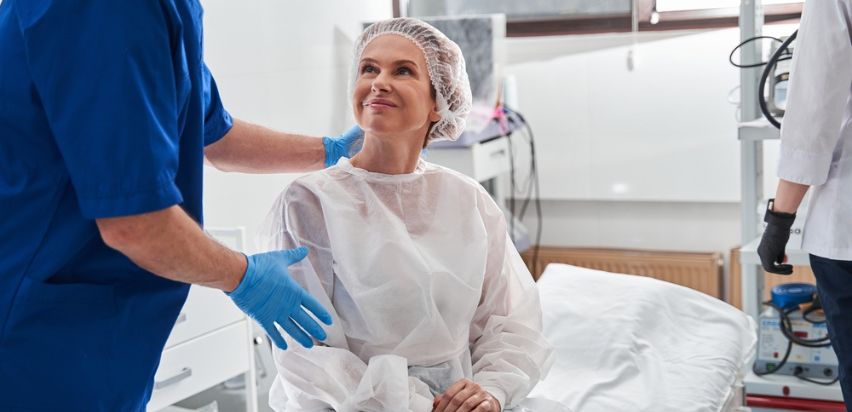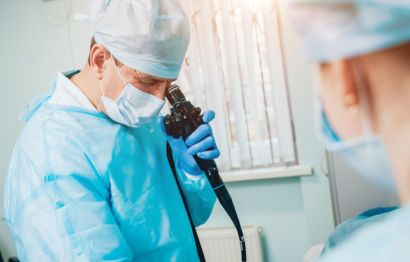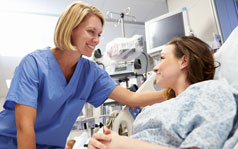What To Expect If You're Having an Endoscopy
An endoscopy is a procedure used to examine a person’s digestive system using an endoscope, a long flexible tube with a light and camera attached to it. If you are having an endoscopy, it is important that you understand what to expect before, during and after the procedure.
Before your endoscopy
Depending on what part of your body is being looked at, you will probably be asked to avoid eating and drinking for several hours before you have an endoscopy
You may be given a laxative to help clear your bowels if you're having a colonoscopy to examine the large intestine, or a sigmoidoscopy to examine the rectum and lower part of the bowel. You will usually also be asked to eat a low-fibre diet in the days before you have a colonoscopy.
In some cases, you may also need antibiotics to reduce the risk of an infection.
If you're taking a medicine to thin your blood, such as warfarin or clopidogrel, you may need to stop taking it for a few days before having an endoscopy. This is to help prevent bleeding during the procedure.
However, do not stop taking any prescribed medicine unless a GP or specialist tells you to.

During an endoscopy procedure
An endoscopy is not usually painful, but it can be uncomfortable. Most people only have mild discomfort, similar to indigestion or a sore throat.
The procedure is usually done while you're awake. You may be given a local anaesthetic to numb a specific area of your body. This may be in the form of a spray or lozenge to numb your throat, for example.
You may also be offered a sedative to help you relax and make you less aware of what's going on around you. The sedative, if required, will be administered through an IV.
An endoscopy usually takes between 15 and 45 minutes, depending on what it's being used for. You can usually go home the same day and do not have to stay in hospital overnight.
Wireless capsule endoscopy
During a wireless capsule endoscopy, you swallow a small capsule with a camera and light in it. The capsule sends images of the inside of your body to a computer for a doctor to look at.
The capsule is the size of a large tablet and leaves your body naturally when you go to the toilet.
It is often used if you have any internal bleeding and there is no obvious cause. It may also be useful for detecting polyps, inflammatory bowel disease (Crohn’s disease), ulcers, and tumours within the small intestine.
There are some complications associated with wireless capsule endoscopy. It can be difficult to swallow the capsule and to pass it naturally. The capsule can also get caught in the narrow areas of your bowel, causing a blockage.
Endoscopy Direct Access Clinic
The gastroenterology group at Mater Private offers direct access to a dedicated consultant-led endoscopy service.
Learn more
After an endoscopy
If you have a sedative, you'll probably need to rest for about one to two hours after having an endoscopy.
If you have a sedative, a friend or relative will also need to take you home after the procedure and stay with you for 24 hours.
If you do not have a sedative, you can go home soon after you have had an endoscopy.
Risks and complications
An endoscopy is usually a safe procedure, and the risk of serious complications is very low.
Rare complications include:
- An infection in a part of the body the endoscope is used to examine – this may require treatment with antibiotics
- Piercing or tearing (perforation) of an organ, or bleeding – you may need surgery to repair any damage
Sedation is usually safe, but it can sometimes cause side effects, including:
- Feeling or being sick
- A bruise or burning sensation where the injection was given
- Low blood pressure (hypotension)
- Breathing difficulties
See a GP if you notice any signs of infection including:
- Redness, pain or swelling near where the endoscope was put in
- A discharge of fluid or pus near where the endoscope was put in
- A very high temperature, or feeling hot or shivery
Other signs of a possible complication after having an endoscopy include:
- Black or very dark-coloured poo
- Shortness of breath
- Very bad tummy pain, or tummy pain that does not go away or keeps coming back
- Vomiting blood
- chest pain
- Difficulty swallowing
See a GP or visit your nearest A&E immediately if you notice any of these signs or symptoms.
Frequently asked questions
Can I eat and / or drink after an endoscopy?
You can resume eating and drinking as soon as you are ready. It is advised to drink plenty of water and start off with lighter, smaller meals. Alcohol should not be consumed for at least 24 hours after the procedure.
What kind of things can be investigated by an endoscopy?
- An endoscopy may be recommended to investigate things such as:
- Chest pain unrelated to any heart conditions
- Blood in stool
- Difficulty with swallowing
- Persistent abdominal pain
- Persistent diarrhoea
- Persistent nausea and vomiting / vomiting blood
- Unexplained weight loss
Are there other options available if I don’t want to have an endoscopy?
If your doctor is recommending an endoscopy, take time to discuss and understand the reasons why, and discuss what alternatives you may have based on your symptoms or conditions.







.jpg?sfvrsn=bc97231b_1)





